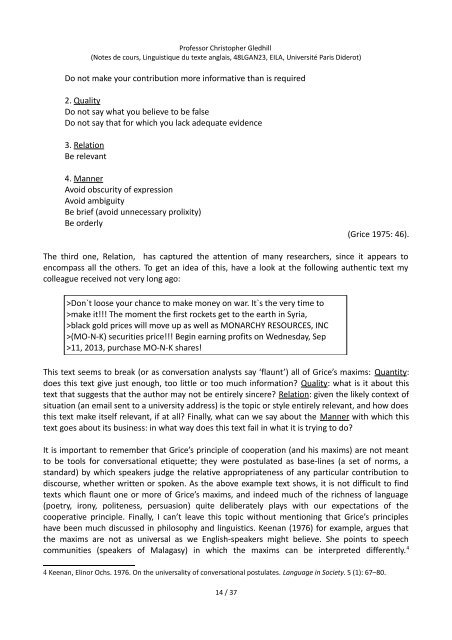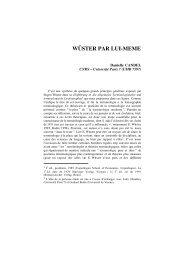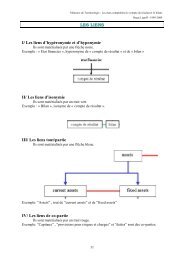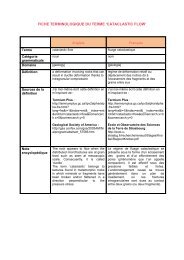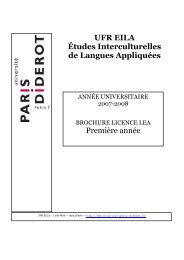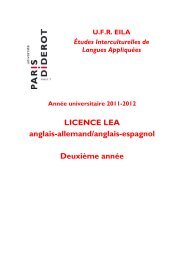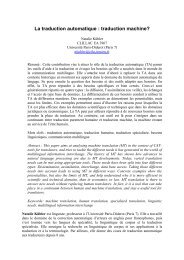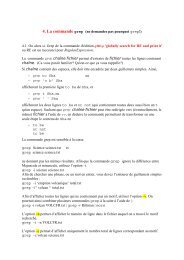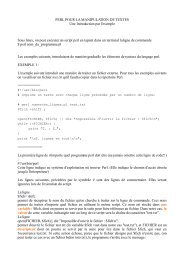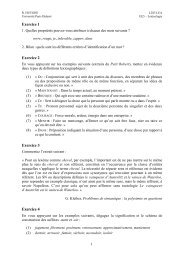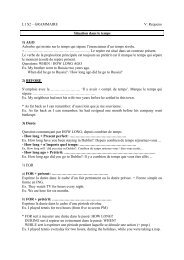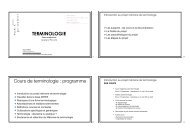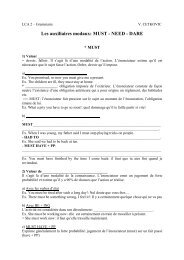INTRODUCTION TO ENGLISH TEXT LINGUISTICS
INTRODUCTION TO ENGLISH TEXT LINGUISTICS
INTRODUCTION TO ENGLISH TEXT LINGUISTICS
You also want an ePaper? Increase the reach of your titles
YUMPU automatically turns print PDFs into web optimized ePapers that Google loves.
Professor Christopher Gledhill<br />
(Notes de cours, Linguistique du texte anglais, 48LGAN23, EILA, Université Paris Diderot)<br />
Do not make your contribution more informative than is required<br />
2. Quality<br />
Do not say what you believe to be false<br />
Do not say that for which you lack adequate evidence<br />
3. Relation<br />
Be relevant<br />
4. Manner<br />
Avoid obscurity of expression<br />
Avoid ambiguity<br />
Be brief (avoid unnecessary prolixity)<br />
Be orderly<br />
(Grice 1975: 46).<br />
The third one, Relation, has captured the attention of many researchers, since it appears to<br />
encompass all the others. To get an idea of this, have a look at the following authentic text my<br />
colleague received not very long ago:<br />
>Don`t loose your chance to make money on war. It`s the very time to<br />
>make it!!! The moment the first rockets get to the earth in Syria,<br />
>black gold prices will move up as well as MONARCHY RESOURCES, INC<br />
>(MO-N-K) securities price!!! Begin earning profits on Wednesday, Sep<br />
>11, 2013, purchase MO-N-K shares!<br />
This text seems to break (or as conversation analysts say ‘flaunt’) all of Grice’s maxims: Quantity:<br />
does this text give just enough, too little or too much information? Quality: what is it about this<br />
text that suggests that the author may not be entirely sincere? Relation: given the likely context of<br />
situation (an email sent to a university address) is the topic or style entirely relevant, and how does<br />
this text make itself relevant, if at all? Finally, what can we say about the Manner with which this<br />
text goes about its business: in what way does this text fail in what it is trying to do?<br />
It is important to remember that Grice’s principle of cooperation (and his maxims) are not meant<br />
to be tools for conversational etiquette; they were postulated as base-lines (a set of norms, a<br />
standard) by which speakers judge the relative appropriateness of any particular contribution to<br />
discourse, whether written or spoken. As the above example text shows, it is not difficult to find<br />
texts which flaunt one or more of Grice’s maxims, and indeed much of the richness of language<br />
(poetry, irony, politeness, persuasion) quite deliberately plays with our expectations of the<br />
cooperative principle. Finally, I can’t leave this topic without mentioning that Grice’s principles<br />
have been much discussed in philosophy and linguistics. Keenan (1976) for example, argues that<br />
the maxims are not as universal as we English-speakers might believe. She points to speech<br />
communities (speakers of Malagasy) in which the maxims can be interpreted differently. 4<br />
4 Keenan, Elinor Ochs. 1976. On the universality of conversational postulates. Language in Society. 5 (1): 67–80.<br />
14 / 37


